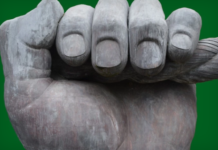Conversion Therapy Ban Will Get a Vote in Palm Beach County
From the Sun Sentinel: Palm Beach County is drafting regulations prohibiting therapists from practicing conversion therapy to try to change a child's sexual orientation. Palm Beach...
A Quiet Rise in Wildland-Firefighter Suicides
From The Atlantic: Over the past decade, there has been a quiet acknowledgement that suicide is widespread within the wildland firefighting community. Both the trauma...
Using Shakespeare to Ease the Trauma of war
From The New York Times: Learning Shakespeare can be a valuable way for veterans to begin to understand and heal from the trauma of war.
Article →
“Why Wunderink Matters”
Sandra Steingard writes in Community Psychiatrist about Lex Wunderink's study, published in the August JAMA Psychiatry, which found that people who discontinued medication have...
“The Anxious Americans”
Tanya Luhrmann writes in the New York Times: "Americans are a pretty anxious people. Nearly one in five of us — 18 percent —...
Yet Another External Review Finds Shocking Flaws in Psychiatric Research at the University of...
Last year, eleven years after the suicide of Dan Markingson in a University of Minnesota drug study, external investigations found evidence of coerced study recruitment, troubling conflicts of interest, shoddy scientific review, deep mistrust of U leaders, and a climate of fear and intimidation in the Psychiatry Department. U leaders solemnly promised the people of Minnesota that they were finally going to clean up the mess. Last week, yet another investigation found that nothing has changed.
“Heal the Artists, Save the World”
Kelly Brogan, MD, writes: "Maybe your depression, chronic fatigue, ADHD, and chemical sensitivity are just ways that your body, mind, and soul, are saying no....
“Companies Seek FDA Approval for Brain Games to Treat ADHD”
Two companies have committed to FDA review for video games that they claim can be used to treat “ADHD,” but many scientists remain skeptical. “At the annual meeting of the American Academy of Child & Adolescent Psychiatry on Wednesday, Akili Interactive Labs presented data from a pilot study of its video game, Project: EVO, that showed some positive results in children with attention-deficit hyperactivity disorder (ADHD).”
“The Antidepressant Generation”
Doris Iarovici, a psychiatrist from Duke University, asks in the New York Times "Are we using good scientific evidence to make decisions about keeping...
App Allows You to Call Volunteers to Help the Homeless
From Healthline: A new app, Concrn, allows users to request assistance from mental health volunteers for homeless people in need. The creators of the app...
“Can You Think Yourself into a Different Person?”
Will Storr, for Mosaic Science, wades into the world of neuroplasticity and explores to what extent our brains are capable of changing through adulthood. He asks if the tendency to overemphasize the findings of epigenetics and neuroplasticity isn’t tied to our cultural belief that individuals are totally free to create themselves and pursue the American dream.
“You Calling Me Crazy? The Perils of Misdiagnosis”
-Lisa Di Venuta recounts how a visit to a university counselor about her mild depression quickly got her onto a downward spiral with multiple psychiatric medications and increasing disability.
“Do You Google Your Shrink?”
-"I knew my psychiatric practice was forever changed the day a patient arrived with a manila folder stuffed with printouts and announced that it contained the contents of a Google search that he had done on me."
Why Placebos Really Are More Effective
Bioethics professor and formal medical doctor Paul Biegler discusses the ongoing battles for effectiveness-supremacy between antidepressants and placebos in The Conversation. "Some think advertising...
“Will following positive psychology advice make you happier and healthier?”
In Mind the Brain on PLOS Blogs, James Coyne reviews some high-profile speakers' claims about the science of positive psychology, and examines more closely whether simply thinking positive thoughts or doing small, good things for yourself can significantly improve overall health, well-being and happiness.
A Cultural History of Extraordinary Bodies
In this episode of the Yale Press Podcast, Lynne Vallone discusses our societal perception of, fascination with, and oppression against people with both small and...
“Learning to Be with Ourselves”
-Elisabeth Svanholmer explores the meaning and nature of "hearing, seeing and sensing things that others don’t."
“ADHD Does Not Exist”
The New Republic assays into the the ripe fields of debate over the ADHD diagnosis.
Article →
Patients’ Drug Options Under Medicaid Influenced by Drugmakers
From NPR: "A Center for Public Integrity and NPR investigation found drug companies have infiltrated nearly every part of the process that determines how their drugs will be covered...
The First Count of Fentanyl Deaths in 2016
From The New York Times: According to the first governmental account of nationwide drug deaths to cover all of 2016, drug overdose deaths increased by...
Psychiatrist Says He was “Coached” in Drug Trial Manipulation
In a video interview with Psychetruth, psychiatrist Dr. Colin Ross provides a concise introduction to the challenges and problems of relying on information from...
Love: At the Intersection of Anti-Racism and Anti-Stigma
In this piece for Beyond Meds, Chris Cole examines the intersection of racism and oppression against people labeled "mentally ill."
"This is where social justice becomes...
Awe is the Everyperson’s Spiritual Experience
From Science of Us: Researchers have found that awe and other Self-Transcendent Experiences have positive consequences for people's mental and emotional health, including enhanced interconnectedness and...
Sunday History Channel: Did Ancient Buddhist Tales Prophesy the DSM-5?
On the Sri Lankan social media platform LankaWeb, medical doctor Ruwan M. Jayatunge recounts stories of difficult states of mind described in the ancient...
“Wage Gap May Help Explain Why More Women Are Anxious and Depressed Than Men”
“According to a new study, the consequences of this wage gap extend beyond the checking account: women who earn less than their male peers...


















